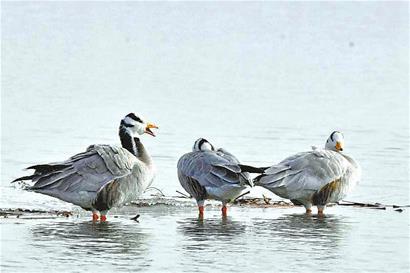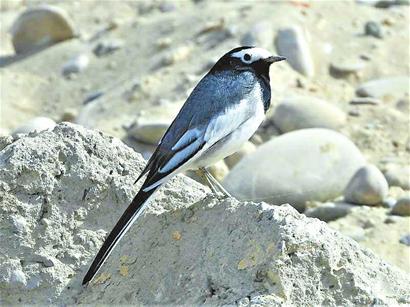
Bar-headed goose
In March, the ice and snow gradually melt, and the migratory birds from the north come to the Chaiwopu Lake National Wetland Park in Urumqi City, northwest China’s Xinjiang, adding vitality to the park.
Chaiwopu Lake National Wetland Park is located in Dabancheng District and is the only national wetland park in Urumqi City.
In recent years, Urumqi City has continued to promote the restoration of the ecological environment of Chaiwopu Lake area, and carried out measures such as limiting groundwater extraction, grazing prohibition aimed at grassland restoration, planting ecological windbreaks, and launching water diversion and lake replenishment projects. The restoration work of Chaiwopu Lake wetland has achieved remarkable results. The covering area of the lake has restored year by year, and the ecosystem of the lake has improved.

White wagtail
On March 7, 2022, reporters came to Chaiwopu Lake, climbed to the viewing platform and saw flocks of migratory birds dancing, foraging and playing, forming a wonderful picture of "paradise for migratory birds".
In the distance, mallards were wriggling their fat bodies and playing in the water, making the sounds of "quack, quack, quack", which was very lively.
"Every March and April, when the snow melts and the lake widens, there are many migratory birds returning from different places, we can observe more than a thousand birds every day." Said Wang Weijun, a staff member of the Chaiwopu Lake National Wetland Park Management Office.
Wang Weijun said that the number of birds has increased significantly in the past two years. Since 2017, birds such as black-headed gulls, mallards, and gray cranes have returned in large numbers. They all like to inhabit lakes, shallow ponds and swamps in grasslands.

Mallard
According to the data, Chaiwopu Lake Basin is one of the five major river basins of Urumqi City and is the "kidney" of water conservation and ecological regulation in Urumqi City. The wetland is nearly 100 square kilometers and a variety of wild animals live in here, including black storks, haliaeetus leucoryphus, haliaeetus albicilla and others under first-class state protection in China.
Wang Weijun said that they monitor the wetland throughout the year. With the gradual improvement of the ecological environment, the wetland is regaining its former vitality, attracting more and more water birds to return.









